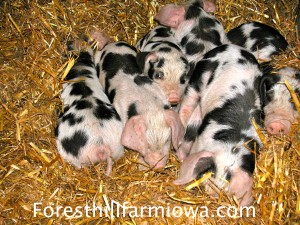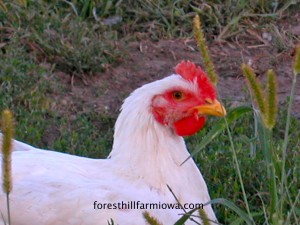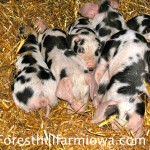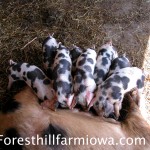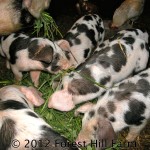I realized that I’ve never explained the reason for my opposition to Genetically Engineered crops. Twenty one years ago we bought a small place in the country, three and a half acres, and started gardening, raising chickens, and pigs. We fed them garden surplus and non-medicated feed. The nearest farms hadn’t switched to genetically engineered seed yet so we could buy directly from the neighbors. Adding supplements and pasture provided the animals with a varied diet and made great meat. These old timers still used a rotary hoe to combat weeds and rotated their crops annually. It was unheard of for a field to have a succession of corn planted year after year. For goodness sake, cover crops were being planted, what were they thinking (this is sarcasm)!
We bought an additional ten acres, added dairy goats, and started milking. Little by little the neighboring farms were passed down to younger family members who were educated in a “modern” approach to crop science. If the universities were praising chemicals and genetic engineering as the answer, then by golly, they must be. Common sense was replaced by corporate subsidies funding education and research. Students became indoctrinated agriculturists who believed that the seed giants and chemists had all the answers.
Monoculture farming started replacing diverse farms. Soon we were surrounded by acres and acres of single crop farm land. Livestock disappeared from the landscape. It either moved to feed lots, into confinement buildings, or off the farm completely.
Soil health became less of an issue. The soil was simply a medium to anchor the root to the ground. Nutrition came from chemical fertilization, not soil. There was a time, not very long ago, when healthy soil was all that mattered. Feed the soil, feed the ecosystem that supports the soil, feed the crop, feed the world. No longer. Now it was feed the seed company, feed the chemical company, feed the world. Erosion control became the new buzz word. No-till drills replaced chisel plowing, discing, and soil conditioning. With the old equipment put aside more chemical applications were required to kill weeds, kill insects and add nutrients. Compaction of soil was the next buzz word. Meanwhile, no guidelines or limits were issued concerning the grade of slope that shouldn’t be cropped. The dead zone in the Gulf grew. Creeks, streams, and rivers collected nitrogen and top soil. Genetically modified crops were sprayed with insecticides and herbicides to increased yields significantly. More profit meant more land was converted to row crops. Genetic engineering turned a profit on average and poor cropland. Bad farming practices were rewarded with higher yields.
We bought more land and continued in our antiquated ways. Meanwhile, a large feedlot for beef cattle (three acres under roof) opened just down the road from us. It was the pride of the university animal science department. Tours, accolades, and national recognition hailed this modern feeding system. Newspaper was printed with soy ink; shredding the newspaper provided soy feed. Mixed with feather meal (from confinement poultry barns in the area), molasses for palatability, and a small amount of corn and hay the cattle were fed for less that $0.08/per day (1994). Oh, and hormone implants added faster gain. When a television crew came to feature this farm on a nationally syndicated weekly farm show we felt that surly someone besides us would find this repulsive. No one did. More of these model systems popped up.
Now we were a family of four. Food issues were important to us, as was education. The more people who visited us and tasted the difference our methods made, the more they remembered their grandparents farms. The price for being different was great. The reward was greater and more satisfying. My wonderful grandmother use to say, “Right is right if no one does it. Wrong is wrong if everyone does it.” What’s ‘right or wrong’ isn’t decided by consensus or popularity, it’s determined by conscience. Raising animals on pasture, without antibiotics or implants, for us, was a conscientious decision. And, no one was doing it, or at least it seemed that way. Fast forward to today; the education is paying off. More small farmers are returning to rural America. Family farms create teamwork; families experience life through labor, laughter and love. We’ll continue to educate and promote healthy choices. We wouldn’t trade our antiquated ways for anything, especially since they’ve become ‘right’ again.
So I’ll be posting a three part series on Genetically engineered crops. Sometimes I’ll refer to them as genetically engineered or GE, transgenic, or GMO. The terms are all interchangeable.

 Your Right to Know
Your Right to Know